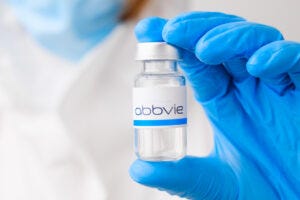
AbbVie says payors will look to consistent global supply as a key differentiator among the many Humira biosimilar makers poised to enter the US market.
AbbVie’s autoimmune monoclonal antibody (mAb) Humira (adalimumab) is the bestselling drug of all time, clocking in over $193 billion for AbbVie (and previously Abbott) since its launch in 2003 to the end of 2021.
Last year alone it pulled in $20.7 billion (though lost out to the industry’s top seller spot due to $36.9 billion in sales of Pfizer’s COVID-19 vaccine Comirnaty, though this level of sales is unlikely to continue as the pandemic fades), with the majority – $17.3 billion – coming from the US, where Humira continues to have exclusivity.

Image: DepositPhotos/
[email protected]
While Humira has faced biosimilars in Europe since 2018, AbbVie has staved off US competition due to its web of patents and legal agreements forged with a host of biosimilar developers. But 2023, the firm is bracing for the US to open up, with up to 10 competitors looking to take a slice of the market – the potential players are: Alvotech, Amgen, Boehringer Ingelheim, Coherus, Fresenius Kabi, Mylan, Pfizer, Samsung Bioepis, Sandoz, Viatris.
At the recent Morgan Stanley 20th Annual Global Healthcare Conference, Jeff Stewart, AbbVie’s EVP and chief commercial officer, acknowledged the competition lining up and said consistency of supply would prove a winning factor among the pack.
“That’s absolutely in the consideration set of a PBM [Pharmacy Benefit Manager] or a payor,” he said. “With Amgen, they’ve been able to consistently supply globally and so a payor will look at Amgen perhaps differently than some of the others in that second tier of the launches.”
Amgen was the first to win US approval for its adalimumab biosimilar Amjevita back in 2016, and through settlement with AbbVie is expected to launch on January 31 2023, five months ahead of the rest.
In context, Stewart was asked about Alvotech, which received a US Food and Drug Administration (FDA) complete response letter (CRL) for its adalimumab biosimilar, AVT02, due to manufacturing deficiencies relating to its Reykjavik, Iceland facility.
“When the payers set their mind to it – despite the fact that there are citrate-free, non-citrate free, different doses, different concentrations – they do have to go through that set to pick which biosimilars [to support],” he said.
“One of the biggest considerations from that notification that we saw with Alvotech is a little bit of, ‘ha, okay, now that makes me nervous,’ even if they can correct it. I mean, I’m sure they can correct it, maybe reasonably quickly, but it sort of raises that continuity of supply with whoever I want to partner with from a biosimilar to a pretty high level.”
About the Author
You May Also Like

schedl_b_and_w.jpg?width=100&auto=webp&quality=80&disable=upscale)
schedl_b_and_w.jpg?width=400&auto=webp&quality=80&disable=upscale)



